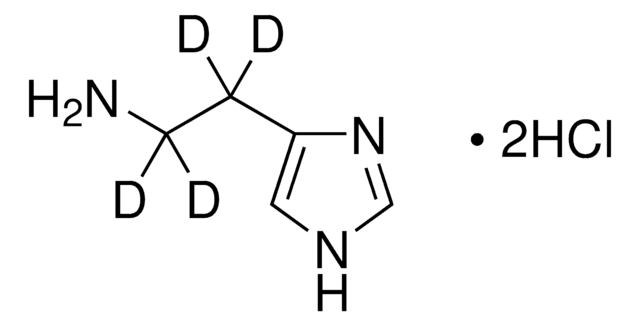H7125
Histamine
≥97% (TLC), powder, H₁ and H₂ histamine receptor agonist
Sinónimos:
2-(4-Imidazolyl)ethylamine
About This Item
Productos recomendados
product name
Histamine, ≥97.0%
assay
≥97.0%
bp
167 °C/0.8 mmHg (lit.)
mp
83-84 °C (lit.)
storage temp.
−20°C
SMILES string
NCCc1c[nH]cn1
InChI
1S/C5H9N3/c6-2-1-5-3-7-4-8-5/h3-4H,1-2,6H2,(H,7,8)
InChI key
NTYJJOPFIAHURM-UHFFFAOYSA-N
Gene Information
human ... CA1(759) , CA2(760) , HRH1(3269) , HRH2(3274) , HRH3(11255) , HRH4(59340)
rat ... Hrh1(24448) , Hrh3(85268)
¿Está buscando productos similares? Visita Guía de comparación de productos
General description
Application
- to stimulate regulated cellular secretion
- in reaction mixture to activate blood for assaying thrombin (factor iia) activity by fluorimetry
- to fill the luminal side of the chamber to investigate its effects on the TJ-related barrier and the expression of TJ (tight junction) markers in the vocal fold epithelium
Biochem/physiol Actions
related product
signalword
Danger
Hazard Classifications
Acute Tox. 3 Oral - Eye Irrit. 2 - Resp. Sens. 1 - Skin Irrit. 2 - Skin Sens. 1 - STOT SE 3
target_organs
Respiratory system
Storage Class
6.1C - Combustible acute toxic Cat.3 / toxic compounds or compounds which causing chronic effects
wgk_germany
WGK 3
flash_point_f
Not applicable
flash_point_c
Not applicable
ppe
dust mask type N95 (US), Eyeshields, Faceshields, Gloves
Certificados de análisis (COA)
Busque Certificados de análisis (COA) introduciendo el número de lote del producto. Los números de lote se encuentran en la etiqueta del producto después de las palabras «Lot» o «Batch»
¿Ya tiene este producto?
Encuentre la documentación para los productos que ha comprado recientemente en la Biblioteca de documentos.
Los clientes también vieron
Nuestro equipo de científicos tiene experiencia en todas las áreas de investigación: Ciencias de la vida, Ciencia de los materiales, Síntesis química, Cromatografía, Analítica y muchas otras.
Póngase en contacto con el Servicio técnico











